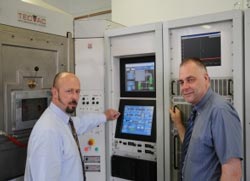
Posted to News on 30th Apr 2010, 14:47
Tecvac supplies custom PVD machine for university research
Tecvac has designed, built and installed a customised twin-beam PVD (physical vapour deposition) machine for use in the University of Sheffield's PVD coatings research programme.

University of Sheffield PVD coatings research programmes are now supported by a twin-beam PVD (physical vapour deposition) machine, known as the IP75, which was designed and built by Tecvac, a member of the Wallwork Heat Treatment Group.
The new facility, valued at over 350,000, will support the Department of Engineering Materials in its research on PVD coatings in the biomedical, automotive and aerospace sectors. Led by Professor Allan Matthews, Professor of Surface Engineering, the work is being carried out in co-operation with many local businesses, and is supported by Yorkshire Forward under a programme co-ordinated through the National Metals Technology Centre (NAMTEC). Further support for Prof Matthews' group comes from funding sources such as the Engineering and Physical Sciences Research Council and the European Union.
Built to specifications developed by Prof Matthews and his colleague Dr Adrian Leyland, the IP75 has a number of notable features as a research machine, including a multiple electron beam configuration that allows complex PVD coatings to be developed with multiple metallic, metalloid and ceramic components, combined in very flexible formulations. It will enable the Sheffield research team to explore many third- and fourth-generation PVD formulations with the objective of developing low-temperature processes to produce novel coatings with beneficial mechanical properties, which are expected to expand PVD applications, especially in the aerospace and medical sectors. Here the IP75 will support a number of research projects to further develop a materials-property-based approach to tribological coatings design and optimisation that focuses on the ratio of hardness and elastic modulus to optimise performance.
Coating control
The set-up on the Tecvac IP75 allows multiple degrees of freedom during coating deposition, and all critical deposition parameters can be controlled independently. This enables the research team to provide a wide variety of closely controlled nanostructures across a range of layer thicknesses.
Professor Matthews explains: "This is an important advantage, since one of our key research priorities is to work towards PVD coatings that are flexible yet hard, and can therefore accommodate deformation of the underlying substrate without becoming detached. The IP75 will also provide the capability to control grain size and orientation at the nano level, often a critical factor in biomedical coatings. This is especially important in developing coatings for implantable medical devices that will be in prolonged contact with body fluids."
One important element of the University of Sheffield's research using the Tecvac IP75 will be devoted to lowering application temperatures. At present some ceramic coatings have to be applied at temperatures of 500degC or more. While the individual coatings are very effective, the high application temperatures restrict the engineer's choice of substrates. There are a significant number of materials that could benefit from an extension of PVD coating processes enabled by lower temperatures. The IP75 will enable the Sheffield team to work on the development of coatings with a lower elastic modulus. The aim is to achieve coatings with ceramic-like hardness but with a low elastic modulus - comparable with steel. Not only is this work expected to achieve better levels of wear resistance, but it also extends the coating lifetime by increasing the resistance to spalling.
Prof Matthews comments: "Naturally, engineers are interested in pure performance, but application consistency, process control and long-term reliability are all crucial, especially in aerospace and biomedical applications. One of our key tasks here is to develop accurate test methods to predict reliable coating behaviour under arduous conditions, such as in abrasive and corrosive environments, and when subject to heavily loaded sliding and impact contacts. This in turn will help build a robust body of knowledge about the critical aspects of coating functionality, so that engineers have all the necessary information to allow reliable specification of coatings with predictable performance and total control of quality."
Follow the link for more information about Tecvac's capabilities for supplying specialist coating equipment.
Want the latest machine building news straight to your inbox? Become a MachineBuilding member for free today >>

















